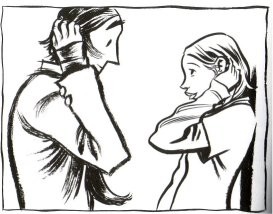
So my Banned Books Week ended up falling a bit short, but I did get through two and start one more, which I’ll finish this week for sure. I’d often heard of Brave New World, but knew absolutely nothing about it going into it, which makes it all the more interesting. The world-building is quite well-executed, which is important in alternate realities or far-future novels, and, like The Handmaid’s Tale, and Fahrenheit 451, the explanation of how their society evolved from present-day norms feels chillingly possible.
I found myself thinking about dystopia and its categorization – is it, by default, Science Fiction? Does it always involve a very clear social commentary, almost a fable-ish moral? Are the fears explored in a dystopian novel usually based on the struggles of author’s own nation, or relevant to human nature in general? And, in connection to discussions I’ve had recently about authors and their beliefs informing their work, is the alternate future always something the author fears, or is it sometimes something s/he believes would be utopian?
I personally don’t often feel “preached at” by books, especially if they’re well-written and I haven’t gone into a story with the expectation that it’s a doom-and-gloom, “This will happen if X Y Z powers that be don’t do something drastic right NOW,” sort of tale. With the explosion of The Hunger Games and the usual slew of similar stories popping up in the series’s wake, I wonder if this trend is facilitated by the media coverage of declining economies and countries on the verge of bankruptcy and political unrest in various regions of the world, and if these books, especially those that are popular among a broad range of ages, are contributing to the general sense of public unease.
Literate Housewife (@LitHousewife) posed the question regarding the Sci Fi Classification on Twitter last night; Tanya Perez (@dogearedcopy), who works in Studio Services at Blackstone Audio and blogs at Dog Eared Copy, made a good point about science versus a change in social conventions driving the difference. If you separate physical science from social science (which is a sticky enough debate in the first place), and if government or what serves for it in the society portrayed is involved, which seems to be the case frequently if not always, then Political Fiction seems to work. And of course, it all fits neatly under the umbrella of Speculative Fiction, which Jen pointed out (@DevourerofBooks). As Literate Housewife and Devourer of Books both just reviewed When She Woke, which is what spurred the conversation, and it already has a 4.44 star rating on LibraryThing, I have a feeling this is one I’ll want to get my hands on sooner rather than later.
As for the question about authors’ opinions of the worlds they create – once that idea popped into my head, my inner monologue went kind of like this: “How could you possibly think that an author might want a world where people are conditioned into social strata from the moment the gametes fuse, or a time in which women have been demoted until they are entirely powerless, or for books to only exist in the minds of an few renegade former professors riding the rails???” Honestly, I don’t believe they do. I do believe that dystopia is a vehicle for authors to express concern for a direction they think we (as a society, as a nation, as a species) may be headed, and to warn of the dangers they foresee. On the other side of the coin, do I think some dystopian fiction has its roots in paranoia? Do the authors really fear that their creation will be our reality in two or five or ten generations if we don’t get our act together? Similarly, no, I don’t think they do. I think it’s a creative means of drawing attention to the ways fanaticism about utterly controlling a population through religion, science, politics, or other means can lead to abhorrent circumstances.
Soooooo, what are your thoughts on all of the above? Have you witnessed anything that’s made you think, “Wow, that’s eerily like that one part in 1984,” or read a dystopian novel that truly made you feel like its proposed reality was not only possible, but probable? Do you stay away from dystopia because it’s too preachy, or too depressing? Do you have a favorite I should check out?



